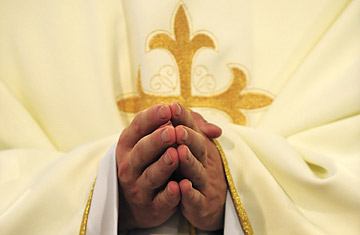
It not only sounds ludicrous as a medical procedure, but in moral terms it's downright barbarous: castrating young men to "cure" them of their homosexuality. Yet this was how the Roman Catholic Church in the Netherlands treated gays in the 1950s, according to a Dutch newspaper, which claims at least 10 men were forced to go under the knife at the church's behest. The extraordinary allegations, which were published last weekend in the NRC Handelsblad newspaper, have prompted Dutch parliamentarians to demand an inquiry into the issue, raising questions about whether the church received political cover to take such extreme measures.
The newspaper said the castrations were regarded both as a treatment for homosexuality as well as a punishment for those who accused clergy of sexual abuse. The newspaper said 20-year-old Henk Heithuis had been surgically castrated on the instructions of Catholic priests in 1956 after he told police he was being abused at the Harreveld boarding school in Gelderland. Although the monks were convicted of the abuse, Heithuis was nonetheless sent to a Catholic psychiatric hospital and then castrated. He died two years later in a car crash. The newspaper adds there are strong indications that at least nine other young men were castrated around the same time, either for whistle-blowing or for supposed homosexuality.
The revelations are especially shocking given the long-standing Dutch traditions of openness and tolerance, notably regarding homosexuality. Same-sex relations have been legal in the Netherlands since 1811, and the country was the first in the world to legalize same-sex marriages in 2001. Perhaps most disturbing, however, is the fact that the castration claims were also missed by an official investigation into sexual abuse in the church published last year. The investigation — headed by Wim Deetman, a former Dutch Education Minister and mayor of the Hague — looked into 1,800 reports of sexual abuse by clergy or volunteers within Dutch Catholic dioceses from 1945 to 2010. While the 1,100-page final report concluded that tens of thousands of children had been abused over 40 years, it did not delve into the castration claims, saying, "There were few leads for further research."
The question now is how much the authorities knew about these activities at the time and whether there has been a cover-up. Minutes of board meetings held at the institutions show that government health inspectors were sometimes present when decisions were made to castrate young boys because of their "homosexual feelings." The minutes also reveal that the heads of the institutions felt they were entitled to make such decisions without consulting the boys' parents. "What lifts this from a level of horrific crime to human-rights violation is what the politicians and the police were doing," says Gauri van Gulik, a women's-rights advocate and researcher for Europe and Central Asia at the New York City–based Human Rights Watch.
There are also allegations that the practice was known to politicians at the highest level, including Victor Marijnen, who was Dutch Prime Minister from 1963 to '65. In the 1950s, Marijnen was vice chairman of the Dutch Catholic child-protection agency and chairman of the Gelderland children's home where Heithuis and others were abused. In that capacity, he intervened to have prison sentences dropped against several priests convicted of abusing children by writing letters to the Queen on their behalf. Marijnen was a member of the defunct Catholic People's Party, which later merged with Protestant political parties to form the conservative Christian Democratic Appeal (CDA).
Since Deetman, who headed the recent investigation into clergy abuse, is also a CDA member, this has raised concerns about whether the inquiry intentionally skipped over the potentially embarrassing role of one of the party's leading figures. As Khadija Arib, an MP from the Dutch Labor Party, says, it suggests a disturbing collusion. "We want the truth, the whole truth to be unearthed. There are still many unanswered questions, including the role of government institutions in the cover-up of this abuse," she says. Deetman himself has refused to comment on the latest allegations. "Mr. Deetman will provide an explanation at a hearing in parliament," his spokesman says. However, the Catholic Church has indicated it is willing to cooperate with any investigation into the castration allegations, and it has already expressed "shame and sorrow" at the child-abuse revelations that the emerged last year.
But Guid Klabbers, chairman of the Dutch association of clerical child sex-abuse victims, says the church is not doing enough to atone for the past. "There is a conspiracy between the Catholic elite and the Catholic politicians in covering the crimes. That seems obvious," he says. Klabbers says one of the reasons that the scandal has remained a secret for more than half a century is because those involved fear ignominy in revealing it. "We need more victims and witnesses to come forward," he says. "But it's not easy to admit you have lost your [testicles]."
